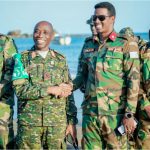Published on 04/06/2025
U.S President Donald Trump on Wednesday said he spoke with Russian President Vladimir Putin to discuss the recent Ukrainian drone attack that destroyed more than 40 Russian aircraft, and the Russian leader said he will respond to Ukraine’s drone strikes.
It remains unclear exactly how Russia would respond.

In a post to Truth Social, Trump said his phone call with Putin lasted about one hour and 15 minutes. In addition to the most recent Ukrainian attack, Trump said, the two also discussed “various other attacks that have been taking place by both sides,” as well as Iran and a general understanding that Iran cannot have a nuclear weapon. The post was later deleted and then re-posted.

“It was a good conversation, but not a conversation that will lead to immediate Peace,” Trump wrote. “President Putin did say, and very strongly, that he will have to respond to the recent attack on the airfields.”
Neither the Kremlin nor the White House has yet to issue a formal readout of the call.
According to Ukrainian officials, Sunday’s attack on Russia took 18 months to plan. More than 100 aerial drones were smuggled into parts of Russia, including Siberia. The drones were then placed around the perimeter of four Russian air bases. Nearly one-third of the Russian bomber fleet was destroyed, according to the Associated Press.
The attack came one day before the two nations were scheduled for another round of peace talks in Istanbul on Monday. The two countries agreed to a further prisoner swap, but failed to achieve any major breakthroughs.
The strikes over the weekend on Russian nuclear-capable bombers were seen by the Kremlin as an “existential threat,” said Tatiana Stanovaya, a senior fellow at the Carnegie Russia Eurasia Center, who said Russia’s response to the strikes would likely be significant.
“Putin wants the West to accept the logic of calling what comes next a ‘Russian response,’ but that’s not accurate,” said Michael Carpenter, who served as senior director of Europe on the National Security Council during the Biden administration. “Ukraine is the party responding to the massive air assaults that Russia has been waging on its cities and towns,” he said.
On Tuesday, Ukraine said that it had struck a bridge connecting the Russian-occupied Crimean peninsula to Russia using underwater explosives. Putin described the incident as an act of terrorism in a call with Pope Leo XIV on Wednesday, according to a Kremlin summary of the call.
On Iran, Trump said Putin could possibly be involved in ongoing talks.
“President Putin suggested that he will participate in the discussions with Iran and that he could, perhaps, be helpful in getting this brought to a rapid conclusion,” Trump said. “It is my opinion that Iran has been slow walking their decision on this very important matter, and we will need a definitive answer in a very short period of time!”
Analysts said that Putin likely raised nuclear talks with Iran in a bid to keep Trump on his side.
“This is one of the key areas where Russia believes it can ‘offer’ something to the United States,” said Carpenter.
The U.S. and Iran have met for five rounds of talks since Trump sent Iran’s Ayatollah Ali Khamenei a letter in March asking to negotiate over its nuclear program and threatening consequences if a deal is not reached quickly. Trump has repeatedly said he prefers to negotiate with Iran over its program but has threatened military action if Iran refuses.
How helpful Russia could be in the current round of negotiations remains unclear, as the dynamic between Tehran and Moscow has changed considerably since the 2015 nuclear deal was reached.
Russia and Iran have grown much closer as Tehran has helped arm Moscow in its war against Ukraine, providing the country with thousands of drones as well as artillery shells.
While Moscow doesn’t want to see Iran gain a nuclear weapon and destabilize the Middle East, continued sanctions on Iran keep the country dependent on Moscow, giving Putin a reliable ally.
Jonathan Panikoff, director of the Scowcroft Middle East Security Initiative at the Atlantic Council’s Middle East Program, said Russia hasn’t been helpful on Iran since Trump left the 2015 deal.
“Putin might be able to help prod Iran on certain aspects around the margins due to the nature of their increasingly deepening relationship, but he’s unlikely to be able to move Tehran on core issues such as its claim to a right of domestic enrichment,” he said.
“At the same time, there’s reason to be concerned that if Putin does help on Iran, it will be used as quid pro quo with the U.S. to try to garner more space and time for Russian operations against Ukraine.”








